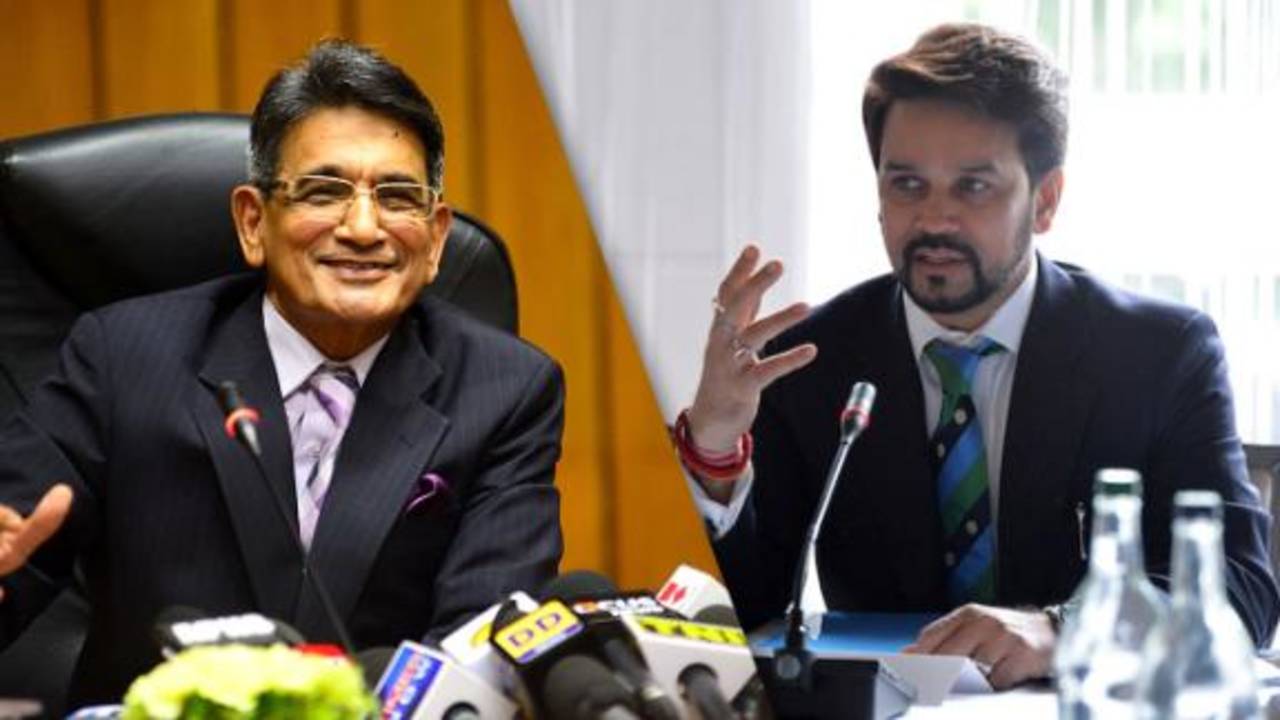Mixture of anxiety and uncertainty before BCCI's SGM
Following the Supreme Court's warning to the BCCI to follow the directive to implement the Lodha reforms, the board's defiance seems to have given way to anxiety ahead of the SGM on Friday
Nagraj Gollapudi and Arun Venugopal
29-Sep-2016
Following the Supreme Court's warning to the BCCI to "fall in line" and follow the directive to implement the Lodha Committee's recommendations, the board's defiance seems to have given way to a mixture of anxiety and uncertainty a day before its crucial special general meeting on Friday in Mumbai.
The agenda for the SGM, the BCCI had pointed out last week, would be to "consider directions of Justice (Retd) Lodha Committee in connection with the formal adoption of the new Memorandum of Association and Rules for the BCCI.''
The court asked the BCCI to respond within a week to the status report submitted by the Lodha Committee on Wednesday. If the BCCI fails to adopt the new Memorandum of Association and Rules at Friday's meeting, the board risks facing further flak from the court. The BCCI could wait for the court to issue a directive based on the board's response to the status order, but either way there were not many options left for the BCCI, keeping in mind the two sets of timelines drawn by the Lodha Committee, the first of which will expire on Friday, September 30.
A number of board members ESPNcricinfo spoke to admitted to being clueless about the BCCI's next course of action, and said it would be chalked out by president Anurag Thakur and secretary Ajay Shirke at the SGM. An experienced administrator termed it a "crisis", but said it was not the end of the road for the BCCI. He felt if the court did not budge, it was time for a new wave of administrators to take charge.
A BCCI office-bearer said the board was looking to drag things for as long as it could. "You should understand one thing: whatever needs to be done, we'll do it," he said. "The affidavit [filed by the BCCI] is just to prolong things as far as possible."
Some members were, however, wary of the aggressive stance taken by the Lodha Committee and the Supreme Court. The president of a south zone association said the BCCI's response had to be measured, and people needed to be "careful" about what they said.
Another office-bearer of the board, meanwhile, faulted the confrontational approach adopted by the BCCI so far, and said the members of the board were not apprised of relevant developments. "Nobody is kept in the loop. Only president and secretary know what's happening," he said. "The BCCI has always been [president and secretary-centric]; that's the problem we have. All the members could have actually interacted individually with the Lodha Committee, but that was denied. From the beginning itself it has been derailed and we have never got an opportunity to put it on track. From there on, things are messed up."
Ever since the court approved the Lodha recommendations on July 18, the BCCI has resolutely opposed them. The main recommendations the BCCI does not agree with are the cooling-off period after a three-year term, imposing an age cap of 70 for administrators, and having an official of the Comptroller and Auditor General on the proposed Apex Council. The proposed Apex Council is itself contentious as it would replace the existing, and powerful, working committee and the one-state-one-vote proposal, which would bring Mumbai, Maharashtra, Vidarbha. Gujarat, Saurashtra and Baroda under one cluster and limit their voting power to just one vote by rotation.
Most state associations, too, have continued to wait for the BCCI's direction on amending their constitutions. So far, only the Vidarbha Cricket Association has decided to put to vote whether the Lodha recommendations can be adopted by the September 30 deadline set by the committee in its first set of timelines.
From being unresponsive at the beginning to openly critical of the Lodha Committee, the BCCI has pursued a combative strategy. Last week, it asked three former India captains, Ravi Shastri, Sunil Gavaskar and Kapil Dev - all hired by the board as television commentators - to back its stance and ask the Lodha Committee to modify some of the recommendations through a dialogue.
However, RM Lodha, the chairman of the Lodha Committee, made it clear that there can't be any dialogue.
"Our recommendations have merged with the July 18 judgment after the Supreme Court accepted them and ordered their implementation," Lodha told the Times of India. "The recommendations are part of the judgment. Any attempt to impede implementation of the reform recommendations would be construed as non-implementation of the judgment itself."
Nagraj Gollapudi is a senior assistant editor at ESPNcricinfo; Arun Venugopal is a correspondent at ESPNcricinfo. @scarletrun
